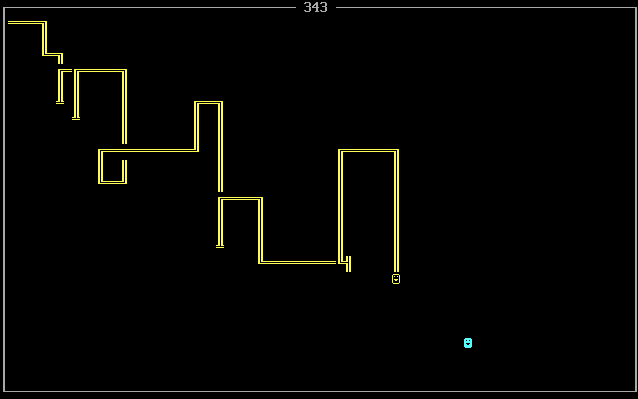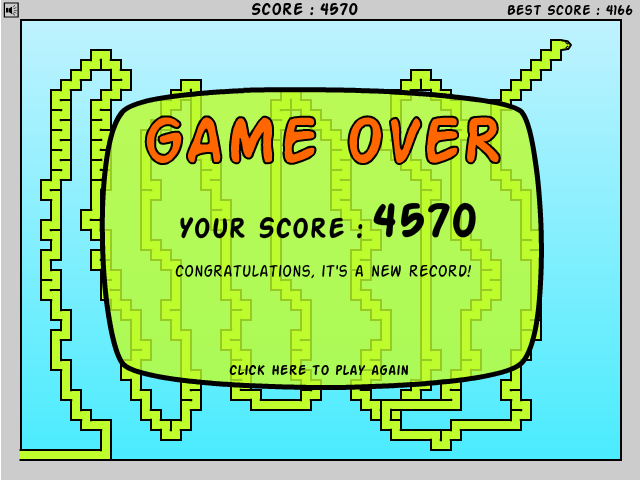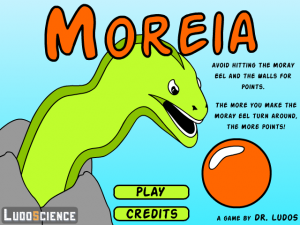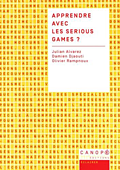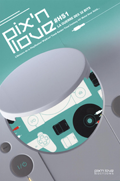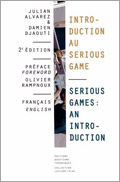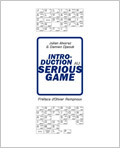LudoScience
Nouveaux supports de cours sur les jeux vidéo Damien Djaouti | 27-09-2013 | 08:51
Cela faisait quelques temps que nous n'avions pas mis à jour la section qui regroupe nos supports de cours, je viens donc d'y rajouter 5 nouveaux supports de cours relatifs aux jeux vidéo :
- Une vue d'ensemble de l'histoire du jeu vidéo (de 1952 à 2013).
- Un panorama des différents métiers du jeu vidéo (de l'industrie des jeux AAA aux indés en passant par les journalistes).
- Une nouvelle version de notre support de cours sur les théories du Game Design (qui aborde les concepts de jeux d'émergence ou de progression, la notion de flow et la théorie du fun).
- Une nouvelle version de notre support de cours sur la structure d'un jeu vidéo (qui tente de répondre à la question "qu'est-ce que le gameplay ?").
- Une introduction aux Serious Games, qui vous propose de découvrir ces jeux vidéo à vocation utilitaire (exemples, chiffres, historique, modes de production...).
Comme d'habitude, ces supports de cours sont au format Flash. Ils sont normalement accompagnés de nombreux documents d'illustrations (images, vidéos, démos de jeux) que nous montrons aux étudiants qui assistent à nos cours. Pour des raisons évidentes de place, il nous est malheureusement encore impossible de vous proposer les versions "complètes" de ces cours (ils pèsent chacun entre 200mo et 1.5go), mais uniquement les transparents, qui permettent néanmoins de voir ou revoir les principaux points abordés dans le cours.
Petite nouveauté sur ces transparents, ils sont dorénavant directement consultables depuis la page web de chaque cours ! (il reste bien évidemment possible de les télécharger pour ceux qui le souhaitent). Concrètement, vous pouvez donc maintenant naviguer dans nos supports de cours en cliquant sur la partie droite ou gauche de l'écran pour faire défiler les slides.
Bonne découverte/révision !
Commenter | Catégorie : Actualités, | Mots-clés : support de cours, jeux vidéo, histoire, métiers, théorie de Game Design, structure d'un jeu,
Moreia sur IndieGames et nouveau record à battre ! Dr. Ludos | 27-08-2013 | 14:01
Un article sur notre jeu Moreia vient juste d'être publié sur le site IndieGames !
Le journaliste est rentré en contact avec l'auteur du jeu auquel Moreia rend hommage : MS Boa, créé en 1989 par Dean Ballard pour le compte de Microsoft. A l'origine ce jeu mettait en avant un nouveau modèle de souris commercialisé par Microsoft. Bien que freeware, MS Boa a été uniquement distribué par le biais des disquettes de drivers de cette souris ! Voici une image de ce jeu méconnu :
Et tant qu'on parle de Moreia, sachez que l'actuel record du jeu est de 4570 points, détenu par Mme Ludos :) !
Commenter | Catégorie : Actualités, | Mots-clés : Moreia, indiegames, record, ms boa,
Appel à communications: JCAL Special Issue on 'Learning Analytics in Massively Multiuser Virtual Environments and Courses' Damien Djaouti | 25-08-2013 | 12:14
CALL FOR PAPERS for a Special Issue of the Journal of Computer Assisted Learning (JCAL) on Learning Analytics in Massively Multiuser Virtual Environments and Courses
There has been much interest of late in ‘big data’ and the role it can play in decision making in diverse areas of business, science and entertainment. By employing a combination of modern artificial intelligence, machine learning and statistics techniques, extremely large and complex data sets can be ‘mined’ in a variety of ways to reveal relationships, patterns and insights not easily discoverable through standard database management tools and data processing applications. In the field of education, data mining approaches have been applied to the analysis of electronic ‘stores’ or repositories of student data for a number of years now (see Romero & Ventura 2005), but this has been occurring largely at the institutional or sector level. Such applications, which are sometimes referred to as ‘academic analytics’ (Campbell, DeBlois & Oblinger 2007; Goldstein & Katz 2005), have not become mainstream, being relevant mainly to governments, funding agencies and institutional administrators rather than students and teachers (Siemens et al. 2011).More recently, a new area of scholarship known as learning analytics (Long & Siemens 2011; Siemens et al. 2011) has emerged that seeks to generate knowledge ‘about learners and their contexts, for purposes of understanding and optimising learning and the environments in which it occurs’ (Siemens 2011, para. 5). This knowledge can be employed for a variety of purposes, among which are to allow learners to reflect on their activity and progress in relation to that of others as well as to assist teachers and support staff in predicting, identifying and supporting learners who may require additional attention and intervention (Powell & MacNeill 2012).
Occurring in parallel is the burgeoning trend towards the delivery of education and learning at a ‘massive’ scale. The last decade has seen an explosion of activity in the use of massively multiplayer online games (e.g. World of Warcraft) and virtual worlds (e.g. Second Life) for both formal and informal learning (see Childress & Braswell 2006; Dalgarno & Lee 2010). These massively multiuser virtual environments (MMVEs) are rife with opportunities for exploiting learning analytics methods to produce enhanced outcomes and experiences for students. At the same time, we have been witnessing a movement in which many universities and colleges, including some of the most prestigious institutions of higher learning in the world (e.g. Harvard, Stanford, MIT and the Universities of Melbourne, Toronto and Edinburgh, to name a few), are ‘opening up’ their course offerings to massive numbers of participants on the Internet (see, for example, Brown 2013; Daniel 2012; McAuley, Stewart, Siemens & Cormier 2013; Siemens, Irvine & Code 2013). In such massive open online courses (MOOCs), the involvement of hundreds, thousands or even tens of thousands of students creates a heighted imperative to devise alternative strategies for feedback and assessment that are less reliant on individual teachers. Learning analytics have the potential to be used in MOOCs to facilitate new models of self and peer assessment as well as to make possible the implementation of a range of automated mechanisms to support and augment students’ self-regulated learning goals and processes.
In recognition of the current interest in both learning analytics and massively multiuser environments and courses, contributions are being solicited for a special issue of JCAL addressing the intersection of these domains. It is clear that dialogue and exchange are needed to bring together the various contributory bodies of knowledge encompassed by the two domains, and one of the aims of the special issue will be to help encourage this. To this end, in addition to manuscripts reporting empirical investigations on the application of learning analytics to learning, teaching and assessment in MMVEs
and MOOCs, those with a theoretical or conceptual focus will also be considered, with interdisciplinary studies and perspectives particularly sought after and welcomed. However, manuscripts whose content is largely or entirely technical with little or no coverage of the pedagogical and/or instructional design-related aspects are unlikely to be included in the special issue. Moreover, case studies that are purely descriptive and do not contain substantive evaluation data, along with those that appear to promote particular products or platforms, will not be accepted.
Suggested Topics
Possible topics include but are not limited to the following:- Learning analytics for adaptation and personalisation in massively multiuser virtual environments and courses;
- Learning analytics for visualisation and recommendation in massively multiuser virtual environments and courses;
- Predictive modelling and forecasting of learner behaviour and/or achievement in massively multiuser virtual environments and courses;
- Design of intelligent tutoring systems specifically for use in massively multiuser virtual environments and courses;
- Dynamic scaffolding of learner activity (e.g. provision of diagnostic/formative assessment feedback) in massively multiuser virtual environments and courses;
- Enhancing motivational and other affective outcomes for students through learning analytics in massively multiuser virtual environments and courses;
- Using learning analytics to support cooperation, collaboration and/or competition among learners in massively multiuser virtual environments and courses;
- Application of social network analysis techniques to optimise learner interactions in massively multiuser virtual environments and courses;
- Strategies for analysing crowdsourced assessment and evaluation data in massively multiuser virtual environments and courses;
- Certification and credentialling (e.g. open badges) based on learning analytics in massively multiuser virtual environments and courses.
Key Dates
Proposal submission deadline: 30 September 2013Notification of proposal acceptance: 28 October 2013
Full manuscript submission deadline: 27 January 2014
Notification of full manuscript acceptance: 26 May 2014
Final manuscripts due: 21 July 2014
Expected publication date: Late 2014
Submission and Review Process
Prospective authors intending to submit manuscripts for the special issue are asked to supply a 500-word extended abstract outlining the content and aims of the proposed article, plus a list of 7 to 10 key references that the article will be informed by and/or draw/build upon. This is to be done by completing the online form at http://goo.gl/nHF272 . The editorial team will review the proposals and identify approximately 10 that would be suitable to be developed into full manuscripts.
Full manuscripts should be prepared in accordance with the JCAL Author Guidelines and submitted via the journal’s ScholarOne Manuscripts system. Manuscripts for the special issue are to be between 4,000 and 6,000 words in length. (Please note that the word count is all-inclusive of the title, author details, abstract, keywords and reference list as well as any tables and appendices that the manuscript may contain.)
Manuscripts must be original and must not have been previously published nor be under consideration for publication elsewhere at the time of submission to JCAL and throughout the duration of the review process. Each full manuscript will be subjected to double-blind peer review. It is envisaged that 6 or 7 articles will ultimately be published in the special issue.
Queries and requests for further information may be directed to the editor-in-charge of special issues for JCAL, Mark J.W. Lee, at jcal.specialissues@gmail.com.
References
- Brown J., ed. (2013) Special issue on MOOCs and technology. Research and Practice in Assessment 8. Available at: http://www.rpajournal.com/dev/wp-content/uploads/2013/05/Vol8_Summer.pdf
- Campbell J.P., DeBlois P.B. & Oblinger D. (2007) Academic analytics: a new tool for a new era. EDUCAUSE Review 42, 41–57. Available at: http://www.educause.edu/ero/article/academic-analytics-new-tool-new-era
- Childress M.D. & Braswell R. (2006) Using massively multiplayer online role-playing games for online learning. Distance Education 27, 187–196.
- Dalgarno B. & Lee M.J.W. (2010) What are the learning affordances of 3-D virtual environments? British Journal of Educational Technology 40, 10–32.
- Daniel J. (2012) Making sense of MOOCs: musings in a maze of myth, paradox and possibility. Journal of Interactive Media in Education 3. Available at: http://jime.open.ac.uk/article/2012-18/
- Goldstein P.J. & Katz R.N. (2005) Academic Analytics: The Uses of Management Information and Technology in Higher Education. EDUCAUSE, Boulder, CO. Available at: http://www.educause.edu/ir/library/pdf/ers0508/rs/ers0508w.pdf
- Long P. & Siemens G. (2011) Penetrating the fog: analytics in learning and education. EDUCAUSE Review 46, 31–40. Available at: http://www.educause.edu/ero/article/penetrating-fog-analytics-learning-and-education
- McAuley A., Stewart B., Siemens G. & Cormier D. (2010) The MOOC Model for Digital Practice. University of Prince Edward Island, Charlottetown, PE. Available at: http://www.elearnspace.org/ Articles/MOOC_Final.pdf
- Powell S. & MacNeill S. (2012) Institutional Readiness for Analytics. University of Bolton, Bolton, UK. Available at: http://publications.cetis.ac.uk/wp-content/uploads/2012/12/Institutional-Readiness-for-Analytics-Vol1-No8.pdf
- Romero C. & Ventura S. (2007) Educational data mining: a survey from 1995 to 2005. Expert Systems with Applications 33, 135–146.
- Siemens G. (2011) Call for Papers for the First International Conference on Learning Analytics and Knowledge (LAK’11). Available at: https://tekri.athabascau.ca/analytics/
- Siemens G., Irvine V. & Code J., eds (2013) Special issue on massive open online courses. MERLOT Journal of Online Learning and Teaching 9, 2. Available at: http://jolt.merlot.org/Vol9_No2.htm
- Siemens G., Gaševiæ D., Haythornthwaite C., Dawson S., Shum S.B., Ferguson R. Duval E., Verbert K. & Baker R.S.J.d. (2011) Open Learning Analytics: An Integrated and Modularized Platform. Society for Learning Analytics Research. Available at: http://www.solaresearch.org/ OpenLearningAnalytics.pdf
Commenter | Catégorie : Conférences, | Mots-clés : appel à communication, revue,
Nouvelle rubrique sur le site : les jeux du laboratoire Ludoscience ! Ludoscience | 16-08-2013 | 12:21
Avec l'été, c'est une nouvelle rubrique qui vient d'arriver sur le site : les jeux du laboratoire Ludoscience !
Cette rubrique vise à vous permettre de jouer aux jeux vidéo que les membres du laboratoire réalisent dans le cadre de leurs travaux de recherche. Elle se distingue donc de la rubrique présentant nos projets de recherche (qui recense tout type de projet de recherche en plus des jeux, et qui présente souvent des jeux qui ne sont pas accessibles au public) ainsi que celles des projets étudiants (qui continuera de regrouper uniquement les jeux réalisés par les étudiants participant à nos cours). Par contre, pas de doublons : sauf exception, les jeux librement jouables en ligne ou téléchargeables seront postés dans cette nouvelle rubrique "jeux", tandis que les autres resteront dans la rubrique "projets de recherche".
Afin d'inaugurer cette rubrique, nous vous proposons un petit jeu d'arcade réalisé par Dr. Ludos, un nouveau membre du laboratoire, game designer de son état, et qui se consacrera principalement à la réalisation de jeux vidéo expérimentaux.
Sa première réalisation, Moreia, est un petit jeu d'adresse qui mettra votre habilité de manipulation de la souris à rude épreuve ! Vous êtes poursuivi par une murène géante, et devez lui échapper le plus longtemps possible tout en évitant de toucher les murs autour de l'écran. Cliquez ici pour jouer directement à ce jeu Flash sur notre site.
Pour information, le record de Ludoscience est pour l'instant de 4200 points ! ;)
Commenter | Catégorie : Divers, | Mots-clés : vie du site, jeu vidéo,
SeGaMed 2013 : Sept 12-14 Nice, FR - Appel à communications Ludoscience | 08-07-2013 | 16:47
SeGaMed 2013 : Sept 12-14 Nice, FR
Appel à communications - Call for proposals
Une édition 2013 qui innove ...
Après le succès de l'édition 2012, la Faculté de Médecine de Nice accueille pour la deuxième fois le colloque international SeGaMed consacré à l'étude des jeux sérieux appliqués à la médecine et à la santé.
Cette année, deux innovations majeures : l'intégration de SeGaMed comme seconde partie des premières Journées de l'Enseignement Universitaire par le Numérique en Santé (les 'JEUNS) et l'organisation d'une master class sur la "gamification" en santé, animée par un panel d'experts français et internationaux.
Accéder à l'appel à communication
Commenter | Catégorie : Conférences, | Mots-clés : Serious game, santé, Health game,
A propos
Ce site présente nos réflexions, nos projets, nos publications et de nombreuses ressources pédagogiques liées au jeu vidéo sous toutes ses formes :
Catégories du blog
Nos ouvrages
Nous suivre
Nos dernier tweets
Liens vidéoludiques
- AFJV Actualités
- Bibliothèque Nationale de France Serious Games
- Genious Serious Games
- Succubus Serious Games
- SGBelgique Serious Games
- AcCréteil Serious Games
- 1984 Advergames
- Ex-Vid Réflexions
- Playtime Réflexions
- Pix'N Love Ouvrages
- Console Syndrome Réflexion & Ouvrages
- Olivier Mauco Réflexions
- Alexis Blanchet Réflexions
- TIGSource Indies News
- IndieGames Indies News
 English
English Français
Français